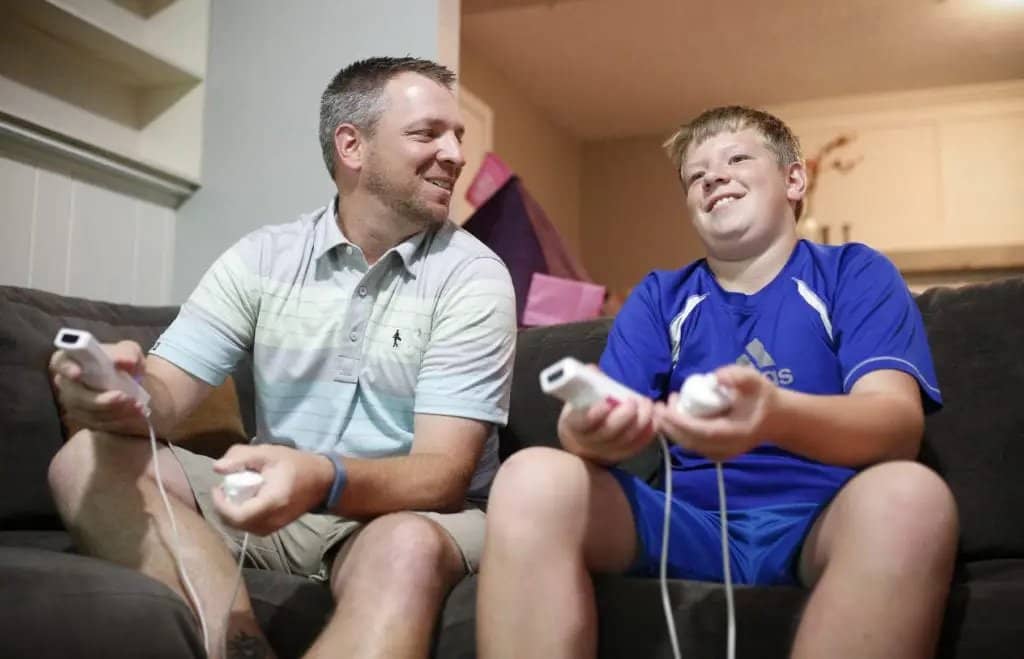
Years of misdiagnoses, Lawrence teen found to have little-known disorder.
Julie and Brandon Urban only wish they had the cards sooner. Then they could have handed them to people who stared at them whenever their son had a tantrum in public. “My child has Klinefelter Syndrome, a genetic condition in which boys have an extra ‘X’ chromosome — 47,XXY,” the cards say. “Although it affects 1 in 600 males, it is typically underdiagnosed because its symptoms often mirror other diagnoses.”
But therein lies the problem. Ben Urban was diagnosed with a variety of conditions — anxiety, bipolar disorder, autism, attention deficit hyperactivity disorder — before his mother did some Internet research and found that his symptoms matched those of Klinefelter’s syndrome.

Lawrence father Brandon Urban and his son Ben Urban, 13, joke with each other while playing against each other in a game of FIFA soccer on their Wii. Ben was recently diagnosed with Klinefelter Syndrome, a rare disease which gives males an extra x chromosome. Brandon has been participating in charity events to raise money and awareness about Klinefelter Syndrome.
So since Ben’s diagnosis in October, the Urban’s, who live in Lawrence, have been on an education campaign — thus the laminated cards — in which they’ve been informing his physicians, school and now the public about the little-known disorder. They not only want to ensure that Ben, 13, gets the proper education and medical care but prevent parents of children with Klinefelter’s syndrome from having to go through what they did: years of misdiagnoses, confusion, and frustration.
“We’ve had some challenging times with Ben,” Julie said. “We tried everything. And the fact that nobody figured it out and I figured it out is sad.”
One of the ways Brandon has been raising awareness about Klinefelter’s syndrome was to play in a charity golf event last month organized by a friend of the family. At the Hundred Hole Hike in Holyoke, Colo., Brandon was on the course for more than 15 straight hours, playing 144 consecutive holes of golf and earning about $4,000 for the American Association for Klinefelter Syndrome Information and Support (he returned a week later to raise money for tiny-K Early Intervention of Douglas County, which helped one of his daughters overcome anxiety issues).
From the time Ben was 2, his parents knew something wasn’t right. He had a short temper, would get depressed easily, couldn’t communicate his feelings. It would sometimes take two or three people to get him into his car seat. He would get upset about a missing ceiling tile or an oddly shaped magazine rack. His development was slow.
Once he entered seventh grade, his grades began to slip. This alarmed Ben’s mom, who started Googling. She eventually landed on a website that described Klinefelter’s syndrome. Symptoms of the condition include tall stature, poor coordination, lack of social skills — and cognitive decline during the middle- and high-school years. “The pieces just fit together and I said, ‘This is it,’” she recalled.
She brought him to the genetic clinic at Children’s Mercy, where he tested positive for the extra X chromosome. Still, much of what the family has learned about the disease has come not from doctors but the American Association for Klinefelter Syndrome Information and Support, which has provided the Urban’s with books and other reading materials about Klinefelter’s that they then share with physicians and school officials.
“Everything we know today is from AAKSIS,” Julie said. “That has been our major source of support.” She said she once heard the condition described this way: “Everybody has 46 books on the shelf. Ben has 47, and he’s going to have to carry that extra book for the rest of his life. And it’s heavy.” Nowadays, Julie says, she could spot a boy with Klinefelter’s syndrome walking down the street: tall and thin, with disproportionately long arms and legs.
But the Urban’s haven’t even heard of another case of Klinefelter’s in Kansas. Even so, they believe there are other Kansans out there with the disease because it is so underdiagnosed. “This affects 1 in 600 boys. They’ve got to be around here somewhere,” Julie said.
Even though their son now has the proper diagnosis, the Urban’s still have challenges ahead. They’ve been told that people with Klinefelter’s generally have the most difficult time during their teenage years and live at home longer than the average male. But they’ve also learned that Ben, who communicates with them largely through text messaging (“When it’s all caps, we know he’s angry,” his mom said), should be “stable” by the age of 25.
If only they would have gotten Ben’s diagnosis sooner, they said, they could have avoided all the unnecessary treatments and medications — what Brandon called the “emotional rollercoaster” of Ben’s early childhood — and gotten him into early intervention.
But they’re at least glad they know now. Their son, who has to take testosterone shots for the rest of his life, has recently been working with therapists on his emotional issues and organizational skills.
As for Ben, he seems like any other shy teenager. He likes water parks and working in the school garden. He enjoys architecture and playing the trumpet. His favorite subject in school is science. “Because you get to do experiments and labs,” he said.
He’s also a goalie in a local soccer league. “I played for club last year,” he said. “I got invited to premier.” In addition, he and his dad have watched nearly every match of the recent World Cup and are big fans of the Sporting Kansas City soccer team. On a recent day, after his father celebrated upon scoring a goal against him in a soccer video game, Ben wasn’t worried, saying: “He normally scores first.”
His parents are hopeful that now that they know his diagnosis, the teen can have an easier life going forward. “Hopefully we have the right support in place,” Julie said.
“We just need to educate people.”